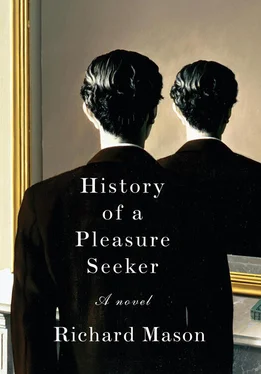This fact was also obvious to Constance and Louisa; and this time Constance did not at all feel like laughing at her sister’s trap. “Perhaps it’s unfriendly of us to make off like this,” she said, as the color drained from Piet’s cheeks. “Why don’t we—”
“Nonsense, darling! It’s perfect weather for a gallop. We mustn’t waste it, especially since Mr. Barol enjoys riding so.”
On the lawn far away, Jacobina saw at once what had happened, and understood that she alone could save Piet from laying his life on the altar of his pride. With a word of apology she left a group of waiters’ wives and hurried towards the party on horseback. When it became clear that they were making for the woods she started to run as fast as her high-heeled shoes and constricting skirts permitted. Jacobina had been an athlete twenty years before and panic restored her powers. She reached them as the groom was opening the gate but was so out of breath she could barely speak. “Mr. — Barol — I–I’m worried about Egbert. I — would like you to return to — Amsterdam.”
But Louisa, in her friendliest voice, said, “Let us have our half hour’s pleasure, Mama. Egbert mustn’t monopolize Mr. Barol.” And with a wicked smile she spurred her horse into a trot, and there was nothing Piet could do to prevent his from following.
To the uninitiated human, the trot of a horse is a profoundly unnatural movement. Piet made the error of leaning forward as he had seen jockeys do, but this revelation of inexperience only confirmed Sultan’s suspicion that a novice had mounted him. Sultan was part Friesian, part Arab, and had an extremely high opinion of himself. He felt for Jacobina Vermeulen-Sickerts a devotion so total he would gladly have died for her in a cavalry charge, as his ancestors had been bred to do. What he would not stomach was the insult of an untrained rider, and he determined to make this plain.
Beside the graceful, straight-backed Vermeulen-Sickerts girls, Piet Barol felt like a fool and knew that he looked like one. He was not often at such a disadvantage and found it irksome. To be asked pleasantly by Louisa how he liked his horse was almost as shaming as the look of anxious sympathy on Constance’s face. He made a valiant effort but could not agree on a rhythm with the beast beneath him; and when Piet whispered Sultan’s name, hoping to soothe him, this presumption of intimacy caused further offense.
As they passed beyond sight of the house, his testicles slamming against the saddle with every step Sultan took, a pain worse than embarrassment began to rise through Piet Barol. Its severity clarified his priorities, and he was on the verge of admitting his lie and apologizing for it when Louisa began to canter.
A hundred years before, a wide avenue had been cut through the ancient woods, but the estate had been derelict before Maarten’s purchase and the forest had seized its chance to recolonize lost ground. Straplings already four feet high were spreading their roots through the gravel and established trees stretched across the clearing for lost friends.
Piet was liable to be decapitated by branches his mistress’ daughters missed by a foot, and Sultan decreed that this should be his fate. He began to go at a tremendous pace. Now terror combined with physical agony to silence Piet emphatically. He had strong thighs and gripped with them for his life, crouching low over the brute’s neck. Several times Sultan swerved abruptly and almost threw him. Piet had never known such fear. As they leaped a narrow stream, the knowledge that he might die rose in his throat. It made him furious — with himself, but more directly with Louisa Vermeulen-Sickerts, because it was clear she would not stop until she had seen him fail.
When they reached the stables, having galloped through the wood and come back over the fields, Piet Barol was aching and bruised and incandescent with rage. He got off his horse, his inner thighs in agony, and without a word strode off towards the house. The fête was ending. The speeches had been made and the band was playing its last march. If he had had a match and a barrel of gasoline he would have torched the place. The idea of going back to the city in the company of the women who had orchestrated his humiliation was insupportable. He tried for a place on the workers’ omnibus — but every seat was taken. I’ll walk then, he decided; but the walk would take the better part of the afternoon and night, and with each step the pain in his groin and buttocks grew worse.
In the end there was nothing for it and he took his place in the Rolls in thundering silence. Constance was the first to follow him. The tenderness in her glance annoyed him enormously. He did not reply when she ventured that it had been a lovely day. Louisa got in. In painful silence they endured the journey to the city, the girls responding to Monsieur Loubat’s cheery queries from the driver’s seat while Piet sat in the furnace of his own thoughts.
Outside Herengracht 605 a crowd had gathered. Servants were unpacking china and glasses from a goods cart; street urchins had congregated, hoping for tips and a glimpse of the ladies in their finery. Piet knew that Didier would laugh when told his story; also that he was not ready to be laughed at. The Rolls-Royce stopped at the foot of the stairs. Monsieur Loubat got out, opened the passenger door on Piet’s side, and bowed.
Louisa had been steadfastly ignoring her sister’s wordless hints ever since entering the vehicle, but now she steeled herself to do what must be done. She leaned towards Piet and touched his knee. “Mr. Barol. Forgive me.”
This was the final provocation.
Piet would have shouted, had Monsieur Loubat not been present to hear. “Are you satisfied now?” The words came out in a strangled compromise between fury and discretion. “I am not as rich as you and I don’t mind admitting it. I have not had so many advantages.” Without waiting for a reply, he jumped to the ground and went up the stairs and into the house. Maarten was in the entrance hall with the manager of the Amstel Hotel. Piet allowed himself to be introduced and agreed that it had, indeed, been a marvelous day. Then he excused himself and went to see to Egbert.
In the house next door, his charge was locked in the depths of the C Minor Prelude. He was just finishing his ninth repetition when Piet entered the room. Because the Shadowers had demanded twenty-one and the presto run towards the end was fiendish, he ignored his tutor as best he could to preserve his concentration.
Egbert played the prelude twice while Piet watched him, fuming. But his next repetition, compounding the day’s earlier indignities, pushed his tutor beyond the limits of his self-control.
Piet picked up the child and slung him over his shoulder. At first Egbert was too astonished to protest but when Piet opened the drawing room door, he began to whimper “No, Mr. Barol. Please, no!” to no avail. At the moment Piet entered the hall, he had no fear of any consequence; was consumed only by a determination to take a stand against this pampered family.
He saw that Jacobina had joined her husband and the manager of his hotel. He did not care. He carried the child through the front door, down the steps and into the crowd. In an act of defiance directed at the whole order of things, he set Egbert down on the cobblestones.
Egbert’s screech made even Agneta Hemels put her hands over her ears. The boy began to hop from one foot to another, as if the street were made of molten steel. He wailed and ripped his hair out in clumps. The servants stood back, aghast. Only Monsieur Loubat took action. He approached, making the solicitous click-click sound he used to calm nervous horses, but at his touch Egbert lunged at him, kicking and biting with the strength of a man twice his age.
Читать дальше












